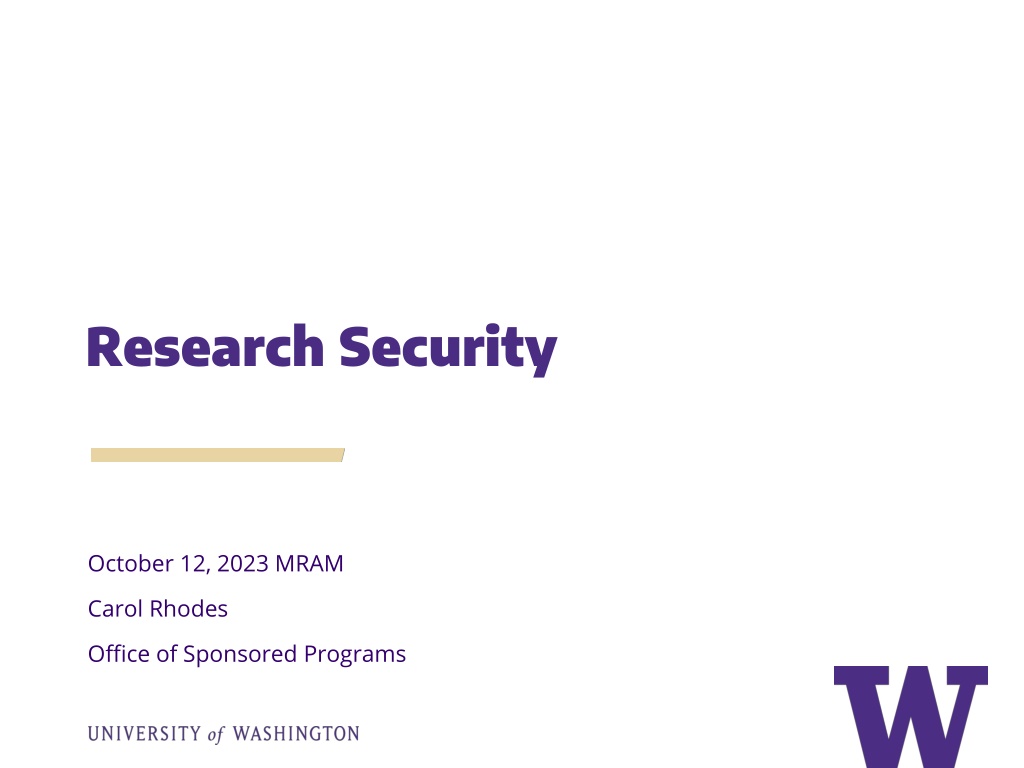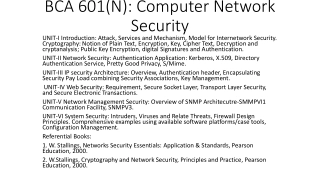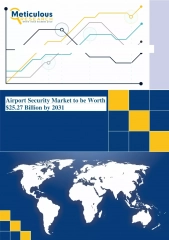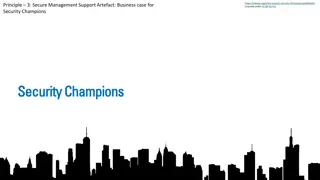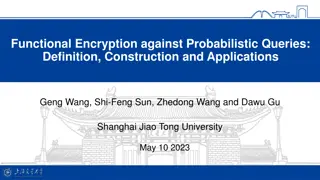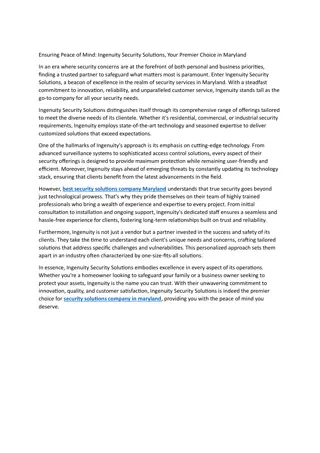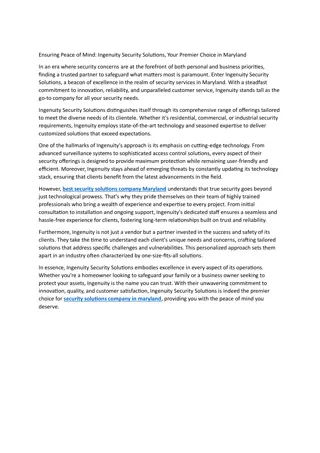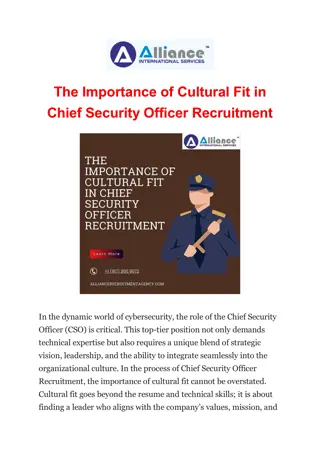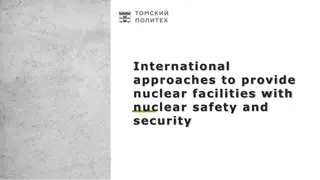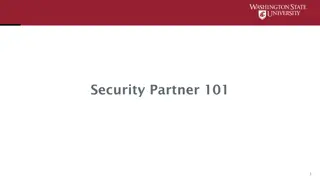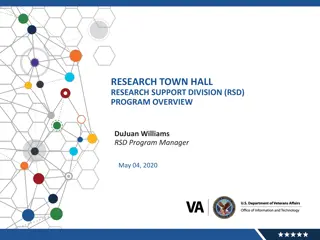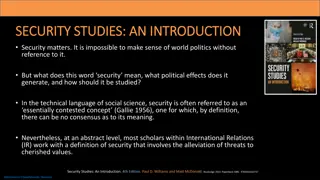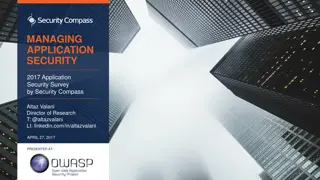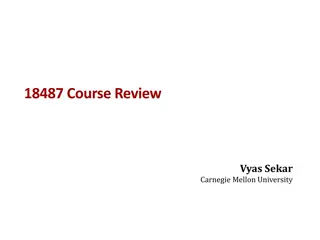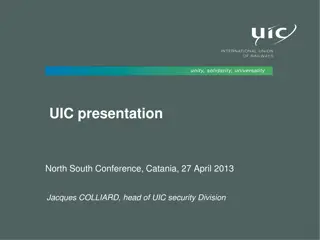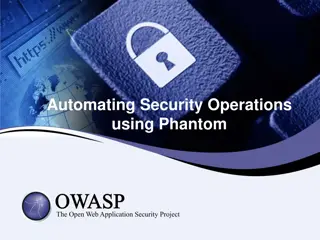Research Security
Research Security involves standardized policies to protect US Government-funded research from foreign interference. Key elements include disclosure requirements, cybersecurity, and export control. Sponsored programs must adhere to strict guidelines on information sharing and foreign participation.
Download Presentation

Please find below an Image/Link to download the presentation.
The content on the website is provided AS IS for your information and personal use only. It may not be sold, licensed, or shared on other websites without obtaining consent from the author. Download presentation by click this link. If you encounter any issues during the download, it is possible that the publisher has removed the file from their server.
E N D
Presentation Transcript
Research Security October 12, 2023 MRAM Carol Rhodes Office of Sponsored Programs
What is Research Security? Standardized policies and practices among researchers and research organizations applying for Federal Research and Development (R&D) awards, in the interest of strengthening protections of US Government supported R&D against foreign government interference and exploitation. White House (Presidential Memorandum on USG- Supported R&D National Security Policy)
Elements of a Research Security Program National Security Presidential Memorandum 33 (NSPM-33) Issued January 2022 Main areas: > Disclosure Requirements and Standardization > Digital Persistent Identifiers > Consequences for Violation of Disclosure Requirements Information Sharing > Cybersecurity > Foreign travel security > Research security training > Export control training Whitehouse: NSPM-33 Implementation Guidance
Sponsored Programs: What do we consider? > Required Disclosures to sponsors > What kind of information or materials will be accessed/shared? - Controlled Unclassified Information (CUI) - Dual Use/Agents > Are Cybersecurity requirements met? > Export Control review, e.g. - Foreign national participation and licensing - Shipping export controlled items > Restrictions on participation/Faculty Council on Research review > Prohibitions on products, technologies - Bytedance - Huawei
Examples of Research Security Steps and Guidance in Place > Foreign Interests in Sponsored Programs > Current & Pending, or Other Support > Foreign Talent Recruitment Disclosure form > Export Control Guidance, Review and ECMPs or Technology Control Plans > No TikTok / Bytedance on devices used with Federal Contracts > EH&S - DURC Training > Procurement Services: Foreign Supplier Guidance and Exceptions
NIH - Subaward/Consortium Written Agreements Subaward agreements must stipulate that foreign subrecipients will provide access to copies of all lab notebooks, all data, and all documentation that supports the research outcomes as described in the progress report, to the primary recipient with a frequency of no less than once per year, in alignment with the timing requirements for Research Performance Progress Report submission. Effective date Jan. 2024, compliance required by March 2, 2024 Note: Similar to retaining your RPPRs, campus units should retain relevant supporting documentation. NOT-OD-23-133 Open Mike
Research Security Training Requirements Coming - Training modules in development - NSF issued solicitation in 2022 to develop research security training for recipients of federal research funding. - This training is an essential step toward mitigating foreign government risks and threats to U.S. government-funded research and may be used to fulfill the research security program requirement in NSPM-33. NSF: Research Security
What is Controlled Unclassified Information (CUI)? Information the Government creates or possesses, or that an entity creates or possesses for or on behalf of the Government, that a law, regulation, or Government- wide policy requires or permits an agency to handle using safeguarding or dissemination controls. Controlled Unclassified Information (CUI) Registry
What is the Cybersecurity Maturity Model Certification (CMMC)? A three-tier model designed to protect Controlled Unclassified Information (CUI) that is shared with contractors (like UW) through acquisition programs (federal contracts). Requires cybersecurity requirements align with National Institute of Standards and Technology (NIST SP 800-171). DoD is going through CMMC 2.0 rulemaking to develop new DFARs. How do I know which standards apply? Once CMMC 2.0 is implemented, DoD will specify the required CMMC level in the solicitation and in any Requests for Information (RFIs) and DFARs will be in impacted contracts.
Research Security Memo When sponsors (such as DoD) include specific research security requirements, e.g. around Controlled Unclassified Information (CUI): OSP reviewers will provide a Research Security Memo to PI to acknowledge. > Memo will indicate requirements imposed by sponsor and ask for confirmation that security requirements are in place > PI acknowledgement and IT administrator or Chair concurrence required
Some Current Sponsor Guidance > DOD Countering Unwanted Foreign Influence in Department-Funded Research > NIH: Foreign Interference > NSF Research Security > Guidance on Disclosures & Foreign Talent Program Participation: NIH, NSF, and DOE > Related agency disclosure requirements such as : DOE interim COI policy requirements NASA COI policy
Whats Coming Up > Final NSTC Common disclosure forms > Final Research Security Program standards > NSF research security training modules > NSF Research Security and Integrity Information Sharing Analysis Organization (RSI-ISAO) > Final NSF 2024 Proposals and Awards Policies & Procedures Guide (PAPPG): Reporting of foreign gifts & contacts to NSF, 2024 PAPPG, Chapt. II.B.2 Certification to NSF of non-participation in malign foreign talents programs, 2024 PAPPG, Chapt. II.D.1.d. & e > COGR: Quick Reference Table of Current & Upcoming Federal Research Security Requirements
